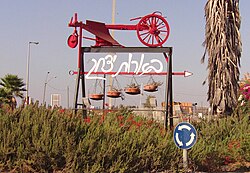Be'erot Yitzhak
|
Be'erot Yitzhak בְּאֵרוֹת יִצְחָק |
|
|---|---|
 |
|
| Coordinates: 32°2′34.07″N 34°54′32.04″E / 32.0427972°N 34.9089000°ECoordinates: 32°2′34.07″N 34°54′32.04″E / 32.0427972°N 34.9089000°E | |
| District | Central |
| Council | Hevel Modi'in |
| Affiliation | Religious Kibbutz Movement |
| Founded | 1943 (original location) 1952 (current location) |
| Founded by | Jewish refugees from Czechoslovakia and Germany |
| Population (2015) | 415 |
| Website | www.beerot.co.il |
Be'erot Yitzhak (Hebrew: בְּאֵרוֹת יִצְחָק, lit. Yitzhak Wells) is a religious kibbutz in central Israel. Located near Yehud, it falls under the jurisdiction of Hevel Modi'in Regional Council. In 2015 it had a population of 415.
The kibbutz was originally established near Gaza (at the present location of Alumim) in 1943 by a group of Jewish refugees (olim) from Occupied Czechoslovakia and Nazi Germany who were members of Religious Pioneers Alliance (Brit Halutzim Dati'im), and was named after Rabbi Yitzhak Nisanboim. The name also recalls the patriarch Isaac's search for water in this area.
In 1947, the village had a population of 150. During the 1948 Arab–Israeli War the kibbutz took serious losses and was badly damaged by the Egyptian Army in the Battle of Be'erot Yitzhak, which included aerial bombardment. According to a report by the Jewish National Fund, the Egyptians were driven out of the grounds and suffered "hundreds" of losses. It was abandoned and its homes destroyed. In 1949 there was a trial of re-establishing the kibbutz on the remains of Wilhema. In 1952 the residents moved to the current site.
...
Wikipedia

